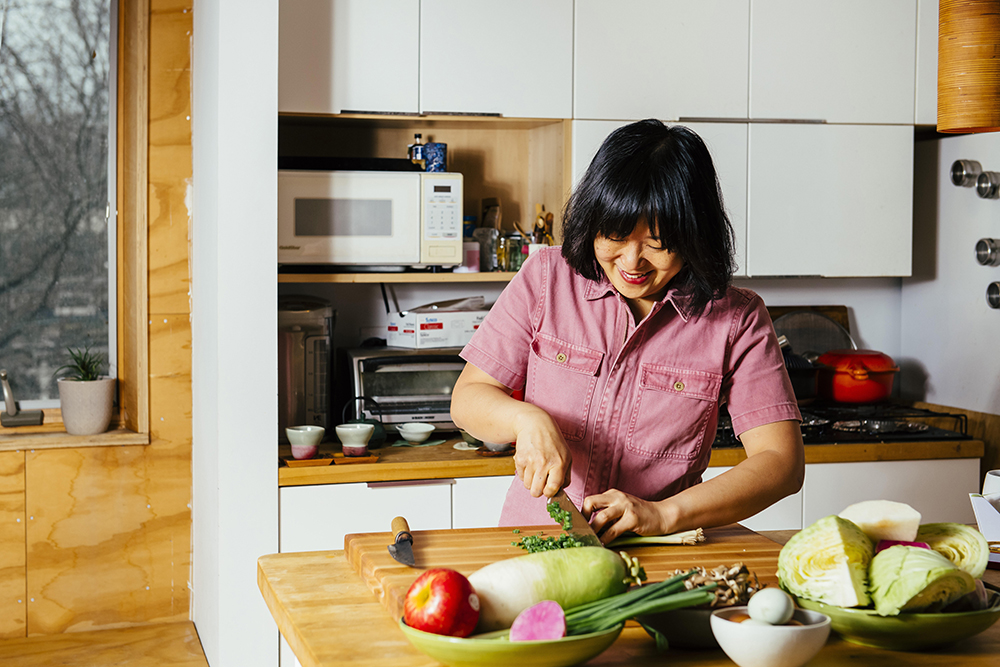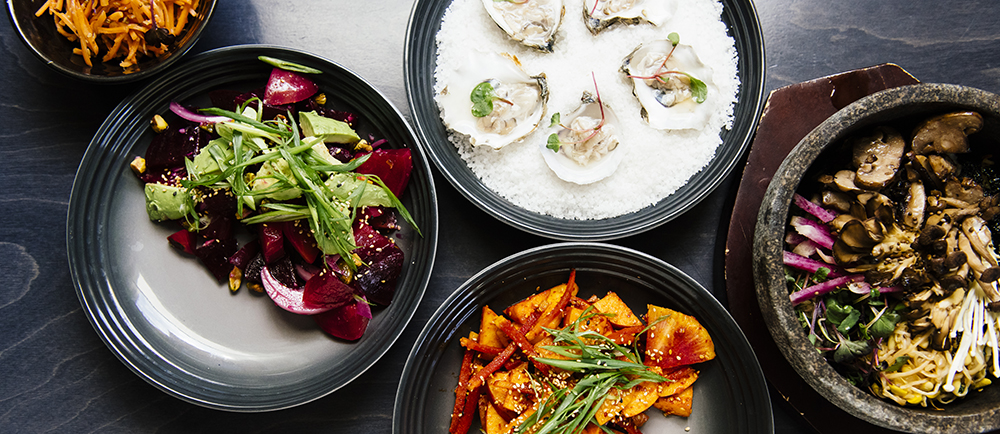When Ji Hye Kim, ’02, opens an old Korean cookbook, she imagines a tapestry filled with the people who cooked the recipes: people who respected the lives of the animals they ate; adapted recipes to incorporate the ingredients that were available to them; people who missed their native homes when they had to move elsewhere.
All of these aspects of Korean cuisine have found their way into the imaginative yet traditionally rooted dishes that fill the menu of Kim’s Ann Arbor restaurant, Miss Kim, which she opened in 2016. Since then, she has landed on semifinalist lists for James Beard Awards three times and was ranked among the Best Chefs in Food & Wine magazine in 2021.
Miss Kim is different from the typical restaurant. It’s a fair wage business, which means there’s guaranteed full pay for front- and back-of-the-house staff members with food priced to supplement these wages, in addition to health insurance, scholarships, and more. Tipping is optional. The system is an equitable management practice she brought with her from her U-M political science days.
But oddly enough, being a chef was “probably the last thing I thought I was going to do,” Kim says.
After studying economics and political science at U-M, Kim worked for a time in hospital administration. Then followed a few years of feeling uninspired, and suddenly at age 27, she found herself in Ann Arbor, and for the first time she felt the luxury of being able to ask herself “what I wanted to do instead of what I had to do.” Her route to nationally acclaimed restauranteur started at Zingerman’s, where she worked at the deli counter making just a sliver of her former salary, but feeling energized.

“It was actually great because I learned so much about food while I was working there. I met artisanal producers from Italy and learned about agriculture and local food,” Kim says. “And I was sitting there thinking, ‘I know all this stuff about olive oil or cheese, and if someone comes in, I can tell them all about who made it, where it came from, and even provide recipes, but we don’t have that for Asian food, and that’s just such a shame.’”
She would later go on to run a small seasonal food cart, and eventually — with help from Zingerman’s Path to Partnership business incubation program — opened her own brick-and-mortar Korean restaurant on 5th Avenue in Kerrytown.
Though she carried her memories of the food she ate growing up in Korea (she used to trade her school milk cartons for a simmered rice cake called tteokbokki from street vendors), she had little formal training in how to prepare it. She turned to cookbooks, 18th century reproductions that she pored over and translated, all while marveling at the ways each recipe reflected its unique time, place, and people.
“I thought it was really interesting because the food looked different than the Korean food that I know, yet it also looked familiar,” she says. For example, there were instructions for fermentation, but not many chili flakes in the recipes — those would come later thanks to Latin American trade and are now considered a quintessential part of the cuisine. There were cookbooks written by noblewomen and peasants, with explicit instructions for who would get to use the recipes in each family, and instructions for cooking with each season — “this is the season when frogs start waking up,” read an old Chinese farmers’ almanac, or “this is the season when the first frost starts hitting the ground.”
“I’m reading the stories and getting inspired by them,” Kim says. “There’s a lot of humanity coming through these cookbooks that I really love.”

One group that inspired Kim was the Koryo-saram group of Koreans who were deported by Joseph Stalin and sent to Russia in the 1930s. Arriving to find no traditional ingredients to make their kimchi, the refugees created a recipe using a spicy pickled carrot with cumin, coriander, and sesame seeds.
“I love the story that they brought part of their ancestors and traditions with them through this very difficult journey,” she says. “That’s the story of this restaurant, to be in a strange land that you haven’t been before — not letting go of where you came from and your traditions and your stories, but also not dogmatically hanging onto it.”
That’s how Kim’s tteokbokki evolved. It wasn’t always considered a humble street food — Kim based her recipe on an old version served to royalty in Seoul and created a bestselling delicate dish made with golden brown rice cakes and house-made gochujang sauce, sweet and spicy with a crispy outside and chewy inside, served with a soft egg. She also filled her menu with her own takes on favorites like bibimbob and Korean-style bánh mì, plus a house-infused Korean spirit called soju, with rotating seasonal infusions like rose, chai, and sesame.
The food at Miss Kim is all informed by Kim’s historical journeys on the page and in memory, but also her inventiveness. It may not be what everyone associates with traditional Korean cuisine, she says, but what she brings to the table is an authentic representation of who she is. That’s reflective of the evolving story of Korean cuisine.
Kim has her sights set on writing her own cookbook someday, as well as opening a plant-based fast casual restaurant — likely outside of Ann Arbor, she says. She also wants to host food tours to Korea, filled with Buddhist temple stays along with plenty of noodles, kimchi, and, most likely, more recipes and new ideas to bring back home.
Cynthia Drake is a freelance writer based in Austin, Texas.





